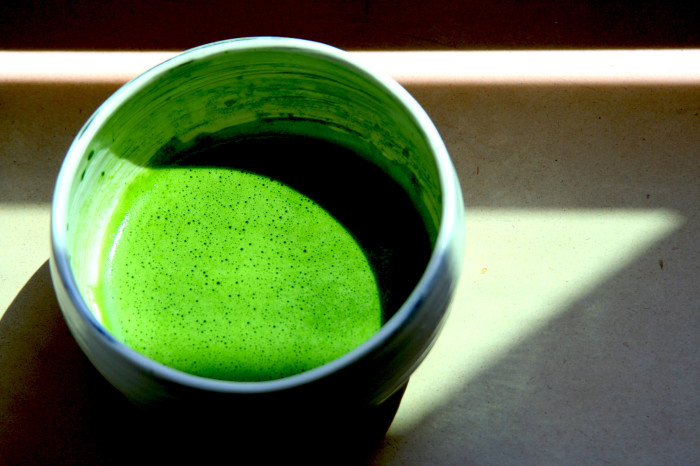- As Americans have shown more interest in alternative health care, certain foods and beverages have gained attention. Whether it is quinoa, kale, green tea, grass-fed beef or goji berries, scientific studies are investigating the value of ancient foods and husbandry practices. Science is always a few thousand years behind tradition.
- As a tea lover, I have enjoyed reading some of the research on the health benefits of tea, a topic that is far from exhausted. One special tea is the Japanese matcha tea.
- All tea comes from the leaves of Camellia sinensis, a white-flowering evergreen. The different processing of the leaves gives you green, black and oolong teas. As the tea leaves start to oxidize and ferment, they gain distinct flavors and aromas. Matcha isn’t fermented (oxidized) at all, but rather steamed immediately and ground into a powder. This powder is then whisked into hot water to make a tea full of “green” flavor with no bitter taste.
- There are a couple of things that make matcha different. First, you consume the whole tea leaf since you consume the tea powder rather than infuse tea leaves. Secondly, because it isn’t oxidized at all, all of the antioxidants in the leaf remain. This translates into the following benefits:
Benefits
- High ORAC value: Oxygen radical absorbence capacity or ORAC is a method of measuring antioxidant capabilities. The ORAC value of matcha tea is one of the highest in the super-food realm, at about 1348 units per gram (or serving).
- One of the antioxidants that matcha is especially high in is Epigallocatechin gallate (EGCG). Matcha has up to 137 times the amount of EGCG as other infused green teas. This particular antioxidant has shown promising results in helping fight against HIV, cancer and many other disorders and diseases.
- EGCG potential HIV-1 therapy: A study demonstrated that EGCG had an anti-HIV-1 effect by preventing the binding of HIV-1 glycoprotein to T cells. This effect holds promise for its use in HIV therapies.
- EGCG and cancer: EGCG holds promise for preventing or treating cancer as well. For example, some studies found that fewer at-risk individuals got cancer when they took EGCG daily.
- EGCG may help with bad breath: It is also associated with suppressing oral pathogens, which could be helpful in treating halitosis (bad breath). Your bad breath may be only a cup of tea away from being gone!
- Matcha a good source of L-theanine: Matcha is a good source of the amino acid L-theanine. One small study found that it had an anti-stress effect. Another found that it has a relaxing effect without causing drowsiness. This may be partly because theanine is involved in the formation of gamma amino butyric acid (GABA), which influences the level dopamine and serotonin.
- May help with fat loss: A study in the American Journal of Clinical Nutrition found that matcha helped with metabolism rate, which holds promise for faster fat loss.
- While coffee has it’s own benefits and disadvantages, matcha may be a better choice for many people because it has a calming effect as well as giving an energy lift from caffeine and other elements from the tea leaf. Coffee can cause jitteriness, and a caffeine high with a crash afterwards. Matcha, while still containing caffeine, tends to cause a more even, long-term energy rise. Plus, with all of those healthy antioxidants, it is a great way to fight against disease and cancer.
References
Source:01 Jun 2012 , www.mnn.com/food/healthy-eating/blogs/the-health-benefits-of-matcha-tea#ixzz3ZZXfGbfn

